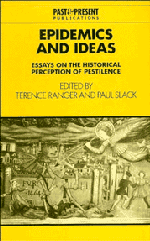Book contents
- Frontmatter
- Contents
- Contributors
- Preface
- 1 Introduction
- 2 Epidemic, ideas and classical Athenian society
- 3 Disease, dragons and saints: the management of epidemics in the Dark Ages
- 4 Epidemic disease in formal and popular thought in early Islamic Society
- 5 Plague and perceptions of the poor in early modern Italy
- 6 Dearth, dirt and fever epidemics: rewriting the history of British ‘public health’, 1780–1850
- 7 Epidemics and revolutions: cholera in nineteenth-century Europe
- 8 Hawaiian depopulation as a model for the Amerindian experience
- 9 Plague panic and epidemic politics in India, 1896–1914
- 10 Plagues of beasts and men; prophetic responses to epidemic in eastern and southern Africa
- 11 Syphilis in colonial East and Central Africa: the social construction of an epidemic
- 12 The early years of AIDS in the United Kingdom 1981–6: historical perspectives
- Index
- Past and Present Publications
2 - Epidemic, ideas and classical Athenian society
Published online by Cambridge University Press: 05 August 2011
- Frontmatter
- Contents
- Contributors
- Preface
- 1 Introduction
- 2 Epidemic, ideas and classical Athenian society
- 3 Disease, dragons and saints: the management of epidemics in the Dark Ages
- 4 Epidemic disease in formal and popular thought in early Islamic Society
- 5 Plague and perceptions of the poor in early modern Italy
- 6 Dearth, dirt and fever epidemics: rewriting the history of British ‘public health’, 1780–1850
- 7 Epidemics and revolutions: cholera in nineteenth-century Europe
- 8 Hawaiian depopulation as a model for the Amerindian experience
- 9 Plague panic and epidemic politics in India, 1896–1914
- 10 Plagues of beasts and men; prophetic responses to epidemic in eastern and southern Africa
- 11 Syphilis in colonial East and Central Africa: the social construction of an epidemic
- 12 The early years of AIDS in the United Kingdom 1981–6: historical perspectives
- Index
- Past and Present Publications
Summary
My focus of attention is the great plague of Athens. However, before analysing the impact of the plague upon contemporary Athenian society, I should like, if I may so describe it, to examine Athenian impact upon the plague. More specifically, I wish to examine Thucydides's treatment of the plague. Thucydides provides our only contemporary account.
The Peloponnesian War broke out in 431 bc. In the early summer of the second year of the war the Peloponnesians again invaded Attica and laid waste to the countryside, whose inhabitants had taken refuge within the Long Walls. The city consequently became seriously overcrowded. Thucydides himself mentions this overcrowding (The Peloponnesian War, Book II, Chapter 52) and Aristophanes, with comic hyperbole, speaks in the Knights (792ff) of the refugees squatting in casks and birds' nests. A few days after the incursion of the Lacedaimonian army into Attica plague broke out in Athens – a pestilence, we are told, of unprecedented mortality. The plague raged ferociously during that year and the next. It subsided and then broke out again in 427 bc, wiping out, it appears, one third of the population of the city (a higher proportion, incidentally, than that of medieval London carried off by the Black Death).
The spread of the plague to Athens and its impact upon that overcrowded city is described by Thucydides in the second book of his History of the Peloponnesian War (Chapters 47–54):
[47] In the first days of summer in the second year of the war the Lacedaimonians and their allies, with two-thirds of their forces as before, invaded Attica. […]
- Type
- Chapter
- Information
- Epidemics and IdeasEssays on the Historical Perception of Pestilence, pp. 21 - 44Publisher: Cambridge University PressPrint publication year: 1992
- 11
- Cited by

